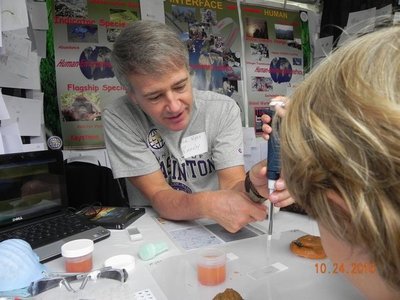November 4, 2010
UW primatologist discusses conservation biology and global health at USA Science & Engineering Festival
What do macaques, parasites and a piece of plastic poop have in common? They’re all used by Randy Kyes, director of the UW Center for Global Field Study, to demonstrate the significance of biodiversity on health.
Kyes, organized the exhibit “What can animals tell us about the future of the earth” for the USA Science & Engineering Festival in Washington, D.C., Oct. 23-24. The free event had more than 1,500 exhibits and attracted about 500,000 people to the National Mall to learn about science, technology, engineering and mathematics.
To capture the attention of the attendees passing by his booth, Kyes placed pieces of artificial animal scat on his exhibit table alongside pipettes, vials and other lab and field equipment.
“Is that real?” was a frequent response to the pretend poop, Kyes said, who used the prop as a way to discuss how much scientific information can be obtained from fecal samples. Kyes is also a research professor in the UW psychology department and an adjunct research professor in global health. He led participants through hands-on activities that demonstrated how animal droppings collected in the field can yield information on parasites and genetics.
In his field work in Indonesia and Nepal, Kyes and his collaborators have found that humans living near primates can swap parasites, which could pose health risks. “Parasites that don’t normally cause illness in primates might cause problems in humans, and vice versa,” Kyes said.
The likelihood of health problems increases as humans spread into areas dominated by wildlife. “Animals are suffering from human encroachment, but the impact on human health could be equally devastating,” Kyes said. “By opening up their environment, we expose ourselves to potentially new diseases and increasing human-animal conflict.”
As part of his exhibit, Kyes brought equipment used by field researchers, such as GPS receivers, trap cameras and radiotelemetry devices used to track animals. Former UW students — Matthew Novak, Katie Hinde and Crista Johnson — helped with the exhibit. All three are alums of Kyes’ International Field Study Program in Indonesia.
In one activity, festival participants could draw their favorite animal. “It was a hit with the little kids,” Kyes said, saying that young attendees filled his booth’s walls with their drawings of potato bugs, jellyfish, gorillas, tigers and other favorite animals.
“I never stopped talking, I never left the booth,” said Kyes, who estimates that his exhibit attracted 200 people of all ages each hour during both sunny days of the festival. “Kids of all ages were fascinated by the work, they were fascinated by the equipment.”
He also explained to attendees how many environmental problems are caused by humans at some level, and that makes wildlife suffer too. For the past 10-15 years, indicator species, such as frogs and corals that are sensitive to the slightest of environmental changes, have been “rapidly disappearing,” he said.
And now robust animals — gorillas, tigers, polar bears — are in trouble. “They’re telling us that we have a real problem on earth,” Kyes said. “People understand this, but I don’t think they appreciate the seriousness of it, how rapidly things are changing. We are clearly at a tipping point.”
Kyes spends about six months a year conducting field work, training and outreach programs around the world in his role as head of the Division of International Programs at the Washington National Primate Research Center and as director of the UW Center for Global Field Study (see our article about the center here. The Center for Global Field Study is based in the UW Office of Global Affairs and affiliated with the Department of Psychology and the Washington primate center.
The USA Science & Engineering Festival includes satellite events around the country, including the Life Science Research Weekend Nov. 5-7 at the Pacific Science Center in Seattle. The free event features demonstrations and hands-on activities for children, families and citizen scientists.

